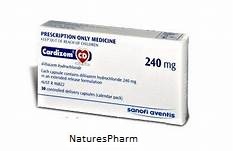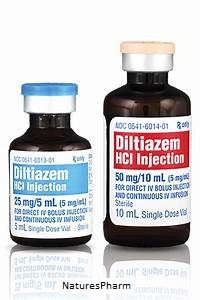What is Cardizem?
Cardizem CD (Diltiazem CD) belongs to the class of generic drugs called anti-hypertensive drugs or calcium channel blockers (CCBs) and is generally used in treating symptoms of high blood pressure (hypertension) or chest pain (angina pectoris).
Cardizem Facts
Calcium is associated with the narrowing of the blood vessels as well as in regulating the electrical impulses within the heart. By blocking calcium, this medication relaxes and widens blood vessels and can normalize heartbeats. Cardizem CD (Diltiazem CD) works by slowing the heart rate and by relaxing and widening blood vessels (arteries), which, in turn, reduces the blood pressure. Widening of the arteries also increases the amount of blood reaching the heart. Calcium-channel blockers slow the rate at which calcium passes into the heart muscle and into the vessel walls, which relaxes the vessels and they allow blood flow more easily through them, thereby lowering blood pressure. In addition, this generic drug also augments the supply of blood and oxygen to the heart. Patients using this generic drug for hypertension should remember that this medication does not cure the problem; but merely controls it. Patients taking this medication for angina should not abruptly stop taking it, as it may result in increased risk of heart attacks.
Cardizem Indications
Cardizem CD (Diltiazem CD) is commonly used to treat high blood pressure (hypertension) and chest pain (angina pectoris). This drug is known as a calcium channel blocker and by blocking calcium, the medication relaxes and widens blood vessels and can normalize heartbeats. Cardizem CD (Diltiazem CD) is more effective for people suffering from the problems of erratic heartbeats. This medication is also prescribed for people who have suffered the problems of Raynaud's syndrome. In addition, this prescription drug is sometimes useful to prevent coronary heart attack. Physicians sometimes prescribe this drug to treat loss of circulation in the fingers and toes, for and involuntary movements (tardive dyskinesia). This medication may be used alone or in combination with other high pressure drugs. It is possible that your physician may have recommended this generic drug for conditions other than what is discussed here. If you have not discussed this with your physician or if you are not sure why you are taking this prescription drug, speak to your physician. Never stop taking this medication without consulting your physician.
Cardizem Dosage
Cardizem CD (Diltiazem CD) should always be taken strictly as recommended by your physician. The usual recommended dose of this generic drug may vary from 30 mg to 360 mg taken once daily. To treat high blood pressure in adults, the starting doses of this generic drug range from 180 mg to 240 mg. While the initial dose for treating angina in adults may vary from 120 mg to 180 mg. It is best to take this medication before meals or at bedtime. This medication should be swallowed as a whole with a full glass (8 ounce) of water. Never chew, break or crush the tablets containing this generic drug, for this may release excessive of the medicine into your system at once. If you forget to take a dose, take it as soon as you remember, but if it's almost time for your next dose, skip the missed dose and go back to your regular schedule. You should continue take Cardizem CD (Diltiazem CD) exactly as prescribed by your doctor, even if your symptoms have disappeared. It is possible that you may have to take high pressure medication for the remaining part of your life. There is no fixed duration for taking this generic drug and its use entirely depends on the problem. Do not stop taking this drug suddenly without the approval of your physician. Your dose of this generic drug may need to be gradually decreased. Remember, a lot of things can affect the dose of this medication that a person needs, such as body weight, other medical conditions and other medications. If your physician has recommended a dose different from the ones discussed here, do not change the way that you are taking the medication without consulting your physician.
Cardizem Side Effects
Usually the side effects of Cardizem CD (Diltiazem CD) cannot be anticipated. However, if you notice any new development or change in their intensity, inform your physician at once for only your physician is able to determine if it is safe for you to continue taking this drug. The most common side effects caused may include exceptionally slow heartbeat, dizziness, exhaustion, fluid retention, flushing, headache, nausea, rash and weakness. Some people using may experience dizziness and lightheadedness, especially during the first few days. Thus, it is advisable to avoid activities requiring alertness and when you sit or lie down for a while, get up slowly to allow your body to adjust and minimize dizziness. Many people taking Cardizem CD (Diltiazem CD) may also experience bloating, heartburn, muscle cramps, headache, flushing, nasal congestion, sore throat, constipation or diarrhea. Consult your physician if any of these symptoms become troublesome. Also inform you physician instantly if you experience breathing problems, swelling of the hands or feet and/ or an erratic heartbeat. Other possible side effects may include abnormal dreams , allergic reaction, amnesia, angina, blood disorders, congestive heart failure, constipation, cough, debility, depression, insomnia, drowsiness, dry mouth, eye irritation, fainting, flu symptoms, hallucinations, hives, impotence, indigestion, infection, skin inflammation, sensitivity to light, taste alteration, thirst, tremor, vision changes, welts, itching, loss of appetite, low blood pressure, muscle cramps, nasal, congestion, inflammation, nervousness, nosebleed, personality change, purplish spots on skin, ringing in ears, sexual difficulties and/ or weight increase. Seek immediate medical help if these conditions occur, persist or worsen. Some people may experience side effects other than those mentioned here; hence check with your physician if you notice any symptom that worries you while you are taking this prescription drug.


